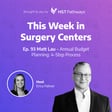Introduction and Format Overview
00:00:01
Speaker
Welcome to This Week in Surgery Centers. If you're in the ASC industry, then you're in the right place. Every week, we'll start the episode off by sharing an interesting conversation we had with our featured guests, and then we'll close the episode by recapping the latest news impacting surgery centers. We're excited to share with you what we have, so let's get started and see what the industry's been up to.
Impact of FTC's Non-Compete Ban
00:00:27
Speaker
Hi, everyone. Here's what you can expect on today's episode. Our guest this week is Alex Tyra, and if you are a member of ASCA, you're probably thinking to yourself, why do I recognize that name? Alex is the regulatory affairs and research manager for ASCA, so he writes all their great articles on
00:00:47
Speaker
OAS caps, the No Surprises Act, and all the legislative updates in between. And he's actually on today to give us all an update on the impact of the FTC's latest ban on non-compete agreements. I think we're all trying to determine how this is going to impact surgery centers, and even the healthcare landscape as a whole, and also when it's going to start impacting us.
News Recap: OR Turnover, Hiring, and Tech Innovations
00:01:08
Speaker
So, Alex shed some light on the basics of the ruling, how it applies to nonprofit entities, and some suggested next steps for ASCs.
00:01:17
Speaker
In our news recap, we'll cover how the concept of a pit crew could help achieve faster and safer OR turnover times, tips for attracting and hiring students fresh out of college, Uber's new offer called Uber Caregiver, and of course, and the new segment with a positive story about how AI is helping triage patients in emergency rooms. Hope everyone enjoys the episode and here's what's going on this week in Surgery Centers.
00:01:51
Speaker
Alex, welcome back to the podcast. Hi, Erica. Thanks for having me. Can you share a little bit about your role at ASCA, please? Sure. I am the regulatory policy and research manager at ASCA. I've been at ASCA since 2017 and I work in the government affairs department, primarily federal regulatory affairs. So mostly Medicare is probably what people have heard from me, but supporting a little bit of everything that we do at ASCA, I would say.
00:02:19
Speaker
Nice. I know I always look forward to your emails and articles. I was glad that we were able to catch up because we have all been seeing so much in the news about the FTC's ban on non-compete agreements and trying to decipher exactly what it means and how it will impact surgery centers has really been pretty tricky. So let's break it down. Can you please explain the basics of the FTC's new ruling on non-competes and why it was implemented?
00:02:48
Speaker
Totally. So yeah, maybe to set the basics a little bit, I'll try not to use too many acronyms here, but for people that aren't aware, the FTC is the Federal Trade Commission. They're an independent federal agency with five commissioners, no more than three from the same party. And the current kind of policies around non-competes were first introduced in a proposed rule in January, 2023. So a little over a year ago, actually.
00:03:15
Speaker
And the FTC had said that they had seen some research showing that non competes negatively affect labor markets. So basically not allowing workers to move freely. And they said that non competes were causing lower wages for workers that are both under non competes and not under non competes. They said there were about 30 million or one in five American workers under non competes.
00:03:36
Speaker
So back a year ago, we actually commented on that proposed rule, opposing the rule, ASCA did.
ASCA's Opposition to Non-Compete Rule
00:03:42
Speaker
And we didn't take a stance on non-compete specifically as a policy, but we did feel that the proposed rule and the kind of blanket ban on non-competes was an overreach of FTC authority. So then fast forward to now and this finalized rule, they voted three to two in favor of the non-compete ban.
00:04:02
Speaker
And we can get into maybe a few more specifics in a bit, but in general, the rule adopts a comprehensive ban on any new non-competes for all workers, and that includes senior executives. It also voids existing non-compete agreements, so that's a big factor in the rule. Except for senior executives, so if there's an existing non-compete, they qualify senior executives as workers in what they call policymaking positions that are earning more than a set wage, in this case, $151,000 a year.
00:04:32
Speaker
And the rule is set to become effective sometime in the fall. We're not entirely sure about the exact date, but it's looking like early September. Yeah, I saw that date as well. And yeah, it's been really interesting because even going back the last few years, in the news and the podcasts, I feel like I'm always sharing updates about certain states that are making waves or things like that. So it's really interesting to see it come at a federal level.
00:05:00
Speaker
I think at least from what I've been seeing like chatter online, the rule has confusing language regarding how it applies to nonprofit entities specifically. So can you take a minute to just explain that further?
Mixed Reactions to Non-Compete Ban
00:05:16
Speaker
Sure. Yeah. Many people who commented on the proposed rule and ASCA included actually, were concerned about how widely the rule was going to be applied, especially for nonprofit entities. So there's many organizations, not just in healthcare, but in other industries that are technically recognized as tax exempt nonprofits, like by the IRS, but really operate as your normal revenue maximizing entities, business entities, that kind of thing.
00:05:42
Speaker
And the proposed rule did address it somewhat, but there was obviously concern that, for example, entities like nonprofit hospitals would entirely avoid the non compete ban, which might have disproportionate effects on the healthcare industry. So the FTC did address this a bit in the final rule.
00:05:59
Speaker
Basically they said that claiming nonprofit or tax exempt status would not be enough to claim an exception from the ban. And they outlined this two part test that has these complicated elements, but basically is your business actually engaged in a business only for charitable purposes? And do any of your members drive a profit? And if your members are driving a profit, then you won't be exempt via your nonprofit status or whatever. So.
00:06:24
Speaker
It's a little confusing there, but I think they were trying to address the commentators who were saying this is going to be unequally applied in some industries. Yeah, that feels a little subjective for some, right? I guess there's some ways to answer that in black and white, but yeah, that's interesting and also confusing. So what has the reception been among the healthcare community as a whole and what are some of the kind of major stakeholders saying since the ban was finalized?
00:06:54
Speaker
Yeah, I would say reception has been mixed in general, as you might expect. Provider groups have generally been in favor of the ban while facilities or large healthcare employers have been opposed. Makes sense when you think about it, a non-compete ban restricts labor movement in an environment like where we are currently, where there's maybe a low supply of some types of providers. They will be able to almost always find better employment somewhere else if they're able to move freely. And obviously they're not compete.
00:07:23
Speaker
restricts their movement. So we've seen hospital groups like the American Hospital Association and the Federation of American Hospitals come out strongly opposed to the ban. And then physician groups like the American Academy of Family Physicians have been supportive. There wasn't, or at least I haven't seen a statement yet from the American Medical Association.
00:07:42
Speaker
but they have been supportive of non-compete bans in the past. So I think you're seeing this split between the providers who are the employees in this situation and the facilities who are the employers on opposing sides of this.
Impact on Surgery Centers
00:07:56
Speaker
And I think at face value, like when I first saw the first articles, it felt like it should be a win for surgery centers. Let surgeons, nurses, and other staff move freely from job to job in a perfect world, leaving hospitals for surgery centers. Let them all migrate out. But can you tell us why in practice this might not be the case?
00:08:19
Speaker
Yeah. And I want to be careful here because I think I'm sure you're aware surgery centers are unique facilities and that I think there are more diverse ownership and administrative structures in our industry than in hospitals or maybe other facility types. So this is why we were careful in our comments to focus on whether the FTC really has the authority to put forward this regulation rather than our non-competes good or bad, because we knew this might affect our members differently.
00:08:49
Speaker
In general, non-competes are a tool to retain employees. So I can see how facilities like surgery centers might use non-competes as an essential protection against poaching from larger competitors. It takes time and energy and resources to train employees, physicians, and surgery centers are often not the biggest fish in the pond. There's probably somebody in your health ecosystem, your immediate health community that could come in and offer maybe
00:09:17
Speaker
and above market employment offer, especially if non-competes are there. I think for some surgery center employees, this will be seen as a good thing because they'll have more employment mobility from the administrative side though. I think there might be instances where the independent ASCs find it very difficult to retain some of their employees because there might be these other offers on the table.
00:09:39
Speaker
Yeah, that makes sense. And think about it with broad strokes. From Asuka's perspective, this ban going into effect will be beneficial for some members, but won't be beneficial for others. So you're coming at it at the viewpoint of, could the FTC even do this at all?
00:09:59
Speaker
Yeah, I think we're thinking like we don't necessarily, we understand that there might be instances in which non competes are beneficial depending on your kind of administrative organizational type. So we don't necessarily want to say whether or not there should be a broad policy in support
00:10:16
Speaker
opposing either way. I think one of the things that we focused on is, does the FTC have a good rationale for putting forward this ban? Are there the effects that they say there are? And specifically in the healthcare industry, is the ban going to have the effects that it intended? And do they have the authority to intervene in this way?
00:10:36
Speaker
We talked about the nonprofit status, which they somewhat addressed, but still this is going to have large scale effects on the balance of power in healthcare, especially between employers and employees. And is the FTC the appropriate agency that says five commissioners, are they the right people to make this large change? That it's not going to affect your surgery centers. It's going to affect everybody. That's where we're coming at it from a national organization perspective.
00:11:02
Speaker
Sure. Yeah, that makes sense.
Employment Strategies for ASCs
00:11:05
Speaker
Looking at your membership base and just surgery centers in general, what do you think are some strategies that ASCs might adopt to navigate any challenges coming their way? Yeah, I think it's going to be interesting to see what the employment strategies are to navigate the ban. I've seen a lot of people say that you need to be thinking about
00:11:30
Speaker
different non, maybe salaried ways to employ and retain employees, so whether that's fringe benefits, that kind of thing. I also think that you should be aware, you made a mention earlier about state versus federal, and I think there are some cases
00:11:48
Speaker
in which states might already have these non competes in effect. And I think the federal, the FTC actually said that they want this ban to be more of a regulatory floor. So there might be instances in which states are already banning these non competes and you might need to be aware of kind of state level regulation that's exceeding the federal regulation as well. I think.
00:12:09
Speaker
It's been flux right now, and we're going to get to maybe some legal challenges in a second. But I would definitely be aware of that September date. And if you have existing non-competes, be aware of what might happen to those after the September 5th date. Again, there is that kind of carve out for our existing non-compete agreements from senior executives. So might want to be familiarizing yourself with what is a senior executive? The FTC uses this policymaking position terminology, which can be a bit confusing.
00:12:37
Speaker
But really taking steps to prepare yourself and maybe thinking about alternative ways in which you can retain employees outside of a specific contractual agreement like a non-compete. Yeah. Even that term, senior executive, feels subjective too. Obviously they're dropping numbers in the salary front, so that makes it a little bit more black and white. But at a small organization, a senior executive could look very different than at a huge organization. So.
00:13:05
Speaker
Totally. Yeah. And they had said in the rule, they didn't want to define roles. So they didn't want to say you're in a senior executive if you're a C-suite, right? For example, or if you have a certain officer title. So they did go into this more subjective vague policymaking test. Do you make decisions that affect your business, your organization's business? But I think it can, it'll get a little confusing who all is subject to the role in the future for sure. If it, if it goes into effect as anticipated.
00:13:34
Speaker
Yeah, definitely.
Legal Challenges Against FTC's Authority
00:13:36
Speaker
You had mentioned this, but perfect segue. What are the next steps in terms of like legal challenges or adjustments to the ruling and how might things like that affect its implementation?
00:13:49
Speaker
Yeah. So we saw basically immediate legal challenges. And I would say the most prominent of those are happening down in Texas in the US district court in the Northern district of Texas. So there's a lawsuit from Ryan LLC, which is a tax consulting firm. And they've been joined by the US chamber of commerce, who sounds official, but they're basically the association that represents businesses. And they've challenged focusing on the FTC legal authority here is the rule.
00:14:18
Speaker
based on any sort of factual evidence about constricting labor supply and lowering wages. There's also an aspect of because the rule invalidates potentially existing non-compete contracts, non-held by senior executives, is this an overreach by retroactive rulemaking?
00:14:37
Speaker
gets all into all this legal jargon. But really the important thing to know is that the court set an expedited schedule and said that they would be rendering a decision by July 3rd, which again is about two months prior to the expected effective date. And what's on the table is really a partial or a complete stay of the ban. I do want to be careful here though, in that
00:14:58
Speaker
I don't want to say one way or another, I think it's too early to say what the court will decide. So I don't want people to think, oh, we'll just wait for July 3rd before preparing to see what we should do by early September. I think surgery centers, businesses should be operating as if the effective date will go into effect and then be keeping an eye maybe on the July 3rd decision date. Certainly ask, we'll be keeping track of that and we'll put out communications to our members and to the larger industry as we know what happens there.
00:15:27
Speaker
Yeah, it's great advice. And I expect nothing less than Texas to start firing off lawsuits as soon as they, as soon as they can. It's funny, almost all like legal challenges to major rules come from Texas. I think it's, yeah. Yeah. I think that's all great advice. And as always, we'll put.
Advocacy and Involvement with ASCA
00:15:47
Speaker
A ton of links to all the stuff you've already published in the episode notes so your members and other people in the industry can have those as a quick reference because I think what you guys are doing is great just in terms of summarizing it on just letting ASCs know what to expect. So we do this every week with our guests. What is one thing our listeners can do this week to improve their surgery centers?
00:16:13
Speaker
Yeah, I guess I think I have to go fully shameless here and just say, get involved with ASCA. And there's a lot of ways you can do that. I think we just had a great in-person conference, our annual conference in Orlando just last month. And we're anticipating obviously another great conference next April to May in Denver. So we'll be looking forward to that. But there's a lot of other ways. I know David Opongwadi, our lead lobbyist at ASCA, would say you could donate to the PAC and that we're always fighting an uphill battle against
00:16:43
Speaker
other industries in terms of funding and legislative advocacy. Attached to that, you could participate in the fly-in. We had members come in February and meet with 161 congressional offices and advocate for policies that are favorable for ASCs. So I think there's a number of ways to get involved. And if you want to have more information on that, obviously, please contact me or anyone you know at ASCA.
00:17:06
Speaker
Yeah, I'm going to butcher this number, but I think it was Bill at ASCA this year at the conference who shared that something like 75% of ASCs who did not pass accreditation were not members of ASCA. I think that was a grain of salt. Some of them were very close to that, but I was really just impressed by the impact that you do have on your members and their ability to operate efficiently.
00:17:33
Speaker
Yeah, and not to be alarmist or anything, but we might, we're going into an election cycle. So there's going to be a lot of potentially policies on the move. We saw a lot of policies potentially changing in 2020 as the administration shifted as the election year got going. So there's a lot to keep an eye on and stay involved. And I think we'll be trying our best to keep members and everyone in the community informed. Perfect. Thanks so much for coming on, Alex. Thanks, Erica.
Efficiency Improvements at Boston Children's Hospital
00:18:03
Speaker
As always, it has been a busy week in healthcare, so let's jump right in. So our first story comes from Outpatient Surgery Magazine, and it's all about turnover times, which is something we've talked about a ton just in terms of efficiency. So back in 2019, Boston Children's discovered that their OR turnover time was averaging 42 minutes for their most complex cases, and that was higher than they wanted to see. So Andrew Smith, who is the Senior Director of Nursing and Patient Care Services,
00:18:34
Speaker
realized that this was something that needed urgent improvement. So in 2022, they launched a Lean Six Sigma project to identify and tackle these inefficiencies. And they ended up finding a few key issues. The three issues they found were that team members weren't communicating well, cleaning tasks were poorly coordinated,
00:18:56
Speaker
and supplies were only gathered at the end of cases. So to solve these problems, they introduced a new hybrid role called the OR Assistant, O-R-A. And these ORAs, dubbed the Pit Crew, joined forces with nurses, techs, and other staff to start turnovers together just like the NASCAR Pit Crew does.
00:19:18
Speaker
And the new system ended up having a huge impact. Turnover times for these complex surgeries dropped to 36 minutes, which is a 14% reduction. And as we all know, every minute in the OR counts. So that's a huge improvement. The hospital also saw improvements in dust control and overall workplace culture as the ORAs felt more valued and integrated into the team.
00:19:42
Speaker
And the hospital shared that communication has been key to their success. Nurses and clinical assistants now lead the way in identifying cleaning needs, which streamlines the process for everybody. And then the anesthesia techs also pitch in, which has helped to ensure a smooth and thorough turnover.
00:20:02
Speaker
Now, I know we're always talking about staffing. So shortages might be a roadblock to implementing this system, but it seems like a really cool and effective way to reduce turnover times, cross train, and build a culture around teamwork. And the article shared the following five steps to get started. Observe your current turnovers.
00:20:25
Speaker
appoint a pit crew flow manager, communicate the plan, conduct comprehensive OR assistant training, and then constantly assess for improvement. So even if it feels like there may not be hope or opportunity for improvement at your surgery center, I think Boston Children's has shown that with this right approach, even the busiest ORs can run like clockwork, can run like clockwork and be as efficient as possible.
Addressing Staffing Shortages at ASCs
00:20:57
Speaker
Our second story is from the May edition of ASC Focus, and it's all about how to attract and hire students fresh out of college.
00:21:06
Speaker
So Aaron Hardwick, who is the executive director of ASCs for Providence St. Joseph Health, summarized it best. Considering the staffing shortage we are experiencing in many markets, graduates represent a largely untapped pipeline of potential employees. I believe it is an absolute imperative that we create mechanisms to bring this emerging talent to our ASCs. And I quote that because I just feel like it really encapsulates the article, but then also the tips that people shared as well.
00:21:34
Speaker
So here are five tips that I rounded up after reading the whole article that were shared by both Chris Skagen, the Executive Director of the Colorado ASC Association and the Oregon ASC Association, and Tina DiMarino, who is the Chief of Operations for Custom Surgical Consultants. And the five tips are the first
00:21:55
Speaker
offer pre-septorship opportunities. So this provides a space for students to complete their clinical rotations and get experience under their belt before they are making decisions about a job. And it's something that's typically only offered at the hospital, right? So they go to the hospital for this opportunity. They start to build that relationship, that comfort level. But if we start offering it at ASCs, if you're able to, it'll just help to build that relationship and awareness.
00:22:22
Speaker
The second is to proactively establish a strong relationship with educational institutions around you and determine how your ASC can help these schools and their students.
00:22:33
Speaker
The third is to partner with organizations like the National Institute of First Assisting. This will allow you, in this one example, to open your doors to provide perioperative educational training and help more nursing students access mock perioperative environments. Again, now they're coming into your surgery center and they're just building awareness and creating a great recruitment opportunity for you.
00:22:57
Speaker
This is a simple, but a powerful one I want to make sure we're not forgetting. In your online job postings, highlight that you have a great opportunity for new graduates and you welcome those fresh out of college to apply. I think we can all remember looking through job applications and they all say, three to five years experience and everyone has that same thought of, how am I supposed to get experience if no one will hire me? So I think if you lay that out in your job postings, people will feel more comfortable applying and reaching out.
00:23:27
Speaker
And lastly, along the same lines, make sure you create a welcoming and supportive environment for new students and new staff and make sure that the culture of your organization supports new grads. So maybe you partner them with a mentor or something like that, just so that they never feel like they're on their own and they're just being thrown to the wolves.
00:23:46
Speaker
So the moral of the story is to make sure you're educating your communities and local schools on what an ASC is, and then also opening your doors as often as you can to build these relationships and a pipeline of graduates.
Patient Transport Innovations
00:24:01
Speaker
And in this third story, just this past week, Uber Health unveiled Uber Caregiver, which is a solution that allows caregivers to coordinate rides and deliveries on behalf of the people they care for. So starting this summer,
00:24:16
Speaker
This new feature will allow care receivers to add their caregivers to their Uber profile. And this means caregivers can now request rides and grocery deliveries on behalf of the people they're looking after. Plus, they'll also get real-time updates on those rides and deliveries. And I think this is the coolest feature. They'll have the ability to have that three-way chat to communicate directly with the drivers. I've called rides for
00:24:41
Speaker
People on their behalf and they're texting me when is the ride showing up things like that this integration I think will allow all parties to see the same thing and then those caregivers who already have so much Administrative work ahead of them on behalf of the people they're caring for this should help simplify it a little bit caregivers will also be able to view the care receivers benefits like how many rides are covered or
00:25:04
Speaker
how much of the monthly grocery benefit is left, and care receivers can even authorize caregivers to pay for services using the app's health benefits. And Uber Health's head of growth is Zachary Clark, and he called caregivers the invisible backbone of the healthcare system. So with Uber Caregiver, the goal is to make ease of the logistical financial and mental burdens caregivers face, and hopefully this app can help provide them with much needed support. That was Zachary's angle.
00:25:35
Speaker
And next, Uber Health plans to expand these services by partnering with Medicare Advantage, Medicaid, and commercial plans hopefully in the future. When it comes to how this impacts surgery centers, I think this just might be a great option for some of your patients to help them get to and from surgery.
00:25:51
Speaker
My mom used to care for my grandma before she passed and I watched how much it impacted her day to day, especially with doctors appointments in the middle of the day. She's trying to take off of work. So maybe there's a caregiver who can't take the whole day off. So perhaps they use Uber Caregiver.
00:26:08
Speaker
to make sure their loved ones get to your ASC safely, and then they'll be able to pick them up and take them home after their procedure is complete. So this might be something you can suggest during the pre-op screening or perhaps let your schedulers and physician offices know that this is an option so they can share it as well. And who knows, it might just end up reducing some of those last-minute cancellations too.
AI in Emergency Departments
00:26:33
Speaker
And to end our new segment, on a positive note, a recent study found that large language models, which is a type of generative AI, can accurately determine which patients in an emergency department need to be seen more urgently. When given pairs of patient histories, these AI models were able to pick the higher acuity patient with 89% accuracy.
00:26:58
Speaker
So why does this matter? Large language models have been making waves, as we all hopefully know by now, with their potential to lighten the load on healthcare providers, especially with tasks like clinical note-taking and drafting responses to patient questions. There's even been research showing that these models can pass medical licensing exams and solve diagnostic challenges, although most of that research has been done in simulated environments, not real life.
00:27:25
Speaker
This latest study, however, did take a real world approach. Researchers at the University of California in San Francisco analyzed over a decade of adult emergency department visits focusing on the emergency severity index acuity score, which ranges from immediate to non-urgent. They sampled 10,000 pairs of visits with different acuity levels
00:27:50
Speaker
and asked the AI to determine which patient needed more urgent care based solely on clinical history. And the results were pretty impressive. The model correctly identified the more serious patient in 8,940 of the 10,000 pairs. And an older version of the model performed slightly worse with an 84% accuracy. So it's already improving and getting better.
00:28:17
Speaker
And interestingly enough, the model was even more accurate, almost 100% accurate when comparing cases with extreme differences, like immediate versus non-urgent, but it did struggle to find the differences and distinguish between less urgent and non-urgent. So when the differences were more extreme, it nailed it, but when the differences were a little closer together, it did struggle there. But the authors did share that this would be
00:28:45
Speaker
unlikely to have significant clinical consequences, but still definitely a bit of a shortcoming there. But the fact that it's already improved from 84 to 89%, obviously trending up and it should continue to get better and better. And this development definitely just highlights the potential of AI to support emergency departments if it can quickly and accurately assess patient acuity.
Conclusion and Call to Action
00:29:09
Speaker
More to come on that, but it's interesting reading these examples of how they're impacting hospitals and emergency departments. But I think from all of these stories from other types of healthcare facilities, there's always, it's always sparking ideas on the surgery center front too.
00:29:27
Speaker
And that officially wraps up this week's podcast. Thank you as always for spending a few minutes of your week with us. Make sure to subscribe or leave a review on whichever platform you're listening from. I hope you have a great day and we will see you again next week.




















